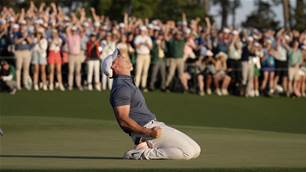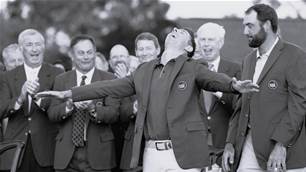Though equally reviled and idolised, he deserved the self-conferred epithet “The Greatest”.
 Getty Images
Getty ImagesThough equally reviled and idolised, he deserved the self-conferred epithet “The Greatest”.
As a social activist and courageous victim of a vicious, duplicitous establishment, he was one of the very few authentic existential heroes sport had seen. Yes, it’s true he was most likely fed one of his most immortal lines by the Nation of Islam: “No Viet Cong ever called me nigger.” But he uttered it. He put his title, his reputation and, given the volatile social backdrop of the 1960s, his very life, on the line.
If Martin Luther King and Malcolm X had come to terms with the fact they may die as a result of their fight for peace and equality (as they did), then many is the time Muhammad Ali must have expected that bullet. For his refusal of the draft, he was stripped of his world heavyweight title ‒ a title he’d defended against tough challengers. Though equally reviled and idolised, he deserved the self-conferred epithet “The Greatest”.
Whether he was the best boxer ever to enter a ring is always going to be debatable. But he was great for a variety of reasons, most of which transcended debates concerning who would have beaten whom on any given night.As a big man, Ali was a true innovator. He broke all the rules. Before his comeback in 1970 he was a heavyweight who fought ‒ and beat ‒ intimidating punchers with his hands down; his blinding hand speed enabling him to land multiple un-telegraphed blows. The speed and stamina of his legs was the most remarkable thing anyone had seen in a ring. Sugar Ray Robinson was renowned for fighting that way, but among heavyweights,it was unprecedented. Ali was cool; Ali was perpetual, fluid motion. No trainer taught him that. Angelo Dundee had the good sense to work with what he had and not change a thing. Just before Ali’s enforced retirement, his movement was so devastating against opponents like Zora Folley and Ernie Terrell, to see him in action was a surreal experience, like watching a film with every second frame removed. He was vicious, he was smart, he was fast, he was unhittable.
When he came back, he still had the old footwork and hand speed, but two years of inactivity had taken their toll. He adjusted accordingly. His versatility allowed him to slug it out with men like Joe Frazier, Oscar Bonavena and George Foreman in ways he’d never demonstrated before and develop new ways to defeat these boxing behemoths. Most notably, his “rope-a-dope” tactic against Foreman, so ingenious, so unexpected, allowed him to free up those fast fists and unleash a fury of rapid, unanswered punches in the eighth round against his exhausted opponent. He declared he’d dance against Foreman, yet leaned back on the ropes, hands uncharacteristically enveloping his head, and absorbed the big man’s monstrous body blows before administering the famous knockout.
When it came to “psych”, Ali was boxing’s ultimate trickster. His poems would predict the round of his opponent’s demise. He came up with the most quotable lines anyone had heard to describe how pretty, how fast, how invincible he was. His pre-fight campaigns against formidable opponents like Frazier, Bonavena, Foreman and Liston, often involving the public, turned the entire event into pure theatre. If a fight lacked a “theme”, he’d create one. He was simply amazing.
After the Thrilla in Manila, the third Frazier fight, rated by many as the greatest heavyweight contest ever, most believed, in retrospect, that both men left it all in the ring that night, and should have retired. But Ali was back three months later, and in the next two years defeated dangerous and legitimate challengers like Jimmy Young, Ken Norton and Earnie Shavers. He faltered again against Leon Spinks, and though he regained the title from him, he was never the same. The early signs of what was later diagnosed as Parkinson’s syndrome had already taken hold.
Ali was sport’s greatest ironist; a dyslexic pug with a poet’s sensibility. Just when we thought he was too in love with his own transcendent beauty and otherworldly ability, he’d pull a piece of folksy genius from his back pocket. Once, standing in front of a hall full of Harvard graduates, he was, as Ali always was, incongruous; a heresy. He should and shouldn’t have been there. At the end of his speech, a student called for a spontaneous poem. Ali knew what to say. It was precious in every sense. He said, “Me, we.”
Destined for perpetual greatness, even in his quietude, Ali has become an ambassador for peace, a symbol for black Americans – he has become many things. But Ali in his pomp was a genius. It’s a word thrown around like confetti sometimes, and many will ask incredulously, “Genius at what?” Ali was a genius at being something that tens of millions of men would have taken instantly, given the chance: he was a genius at being Muhammad Ali. And Muhammad Ali was, and still is, one in a millennium.
‒ Robert Drane
Related Articles

Feature Story: Moving the Needle

The Aussies at The Open













